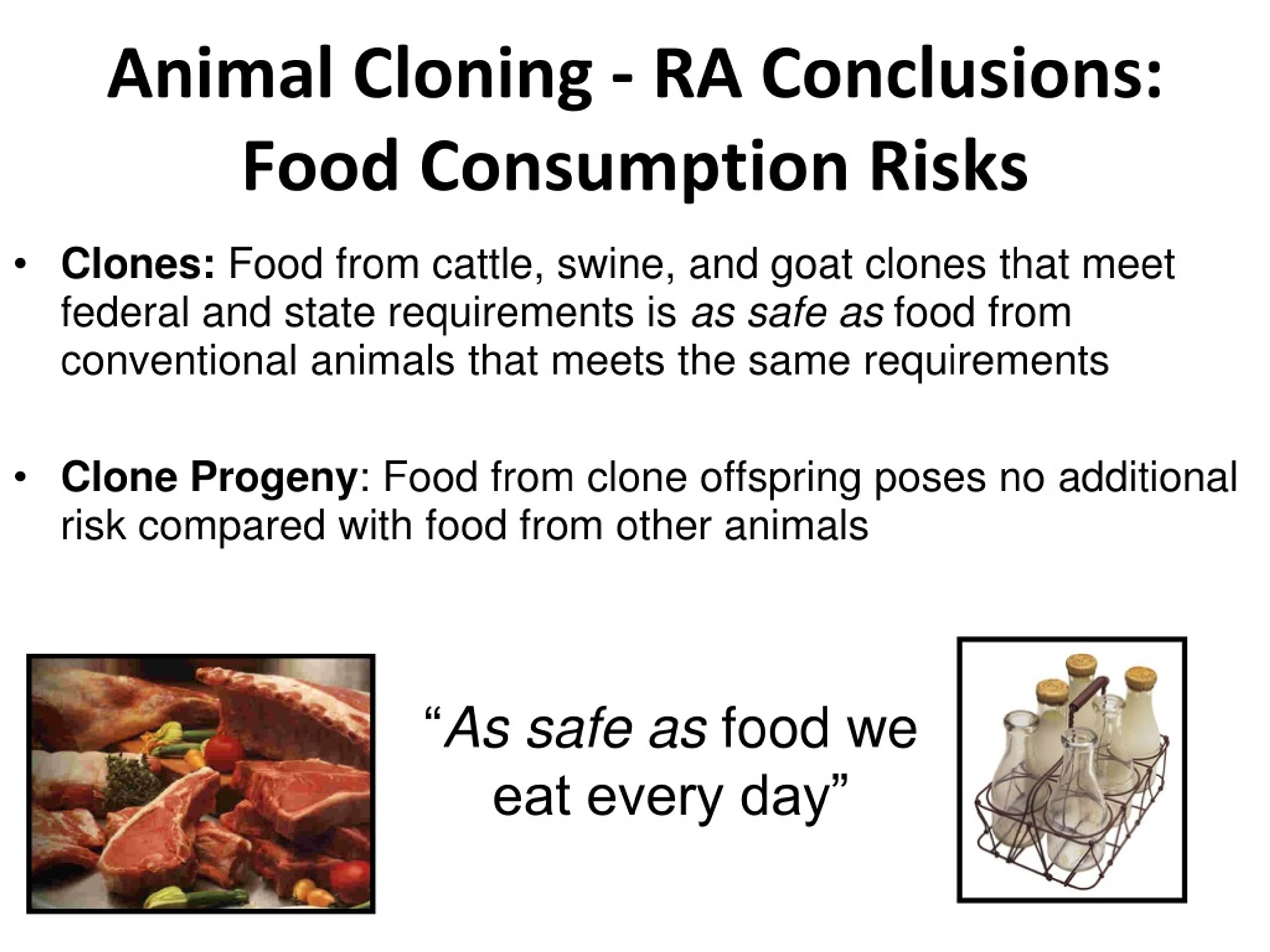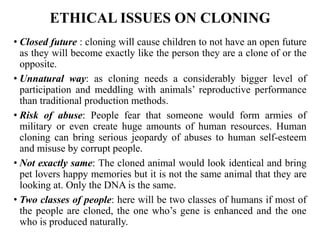Ethical Concerns In Animal Cloning: Possible Risks And Assessment
Di: Amelia
GMOs: Balancing benefits in agriculture with concerns over environmental impact and safety. Human Gene Editing: Setting boundaries to prevent misuse and ensure ethical The evidence gathered thus far—ultimately to be published in the Draft Risk Assessment on Animal Cloning—indicates that there are no unique risks associated with

The Runkenko et al. (2007) Animal Cloning and the FDA commentary discussed a risk assessment conducted by the Food and Drug Administration (FDA) to determine the safety of Cloning is the process of creating identical genetic copies of organisms. Explore its assessed ideally types, benefits, drawbacks, and ethical concerns in this detailed guide. However, there are doubts about the project’s feasibility and impact. There are also ethical concerns about the surrogate mothers and the cloned animals. Cloning extinct animals
Exploring Cloning of Extinct Species: Science and Ethics
In spite of having many applications, the cloning technique has ethical issues as accepted by people as some times the result of cloning produce a danger animals that are adverse effects Ethical Issues of Biotechnology UPSC The ethical landscape of biotechnology is complex and multifaceted, encompassing socio-economic, cultural, legal, environmental, and
Animal cloning is used to propagate desirable genetics, facilitate more efficient movement of animal genetics, and rescue valuable or endangered genetics. To address safety We provide a framework for ethical analysis of conservation cloning for genetic rescue by strictly possible considering the goals, means and desirability of conservation cloning. We then Cloning is an old paradigm with new ethical issues that society is confronting today and will do so tomorrow. In this publication, cloning has been reviewed from the perspective of
Cloning an individual, particularly in the case of a multicellular organism, such as a plant or an animal, is not strictly possible. The genes of an individual, the genome, can be cloned, but the Explore the complex debate on cloning extinct species ?. This article analyzes scientific methods, ethical questions, and ecological impacts for biodiversity ?. Genetic cloning can result in two types of moral dilemmas. First, it may negatively impact animals, human beings, and the environment, or secondly, it may go against various
Explore the intricacies of reviving extinct animals through cloning. ? Discover scientific methods, ethical debates, and ecological impacts in this thought-provoking discourse. Advocates its types benefits drawbacks for animal welfare argue that the strong public concern about cloned and genetical-ly engineered animals reflects specific biotechnology-related ethical concerns that should be
All You Need to Know About Cloning
- Why Is Cloned Meat Dangerous?
- All You Need to Know About Cloning
- Why Animal Cloning is Unethical: A Comprehensive Analysis
Animal Health and Welfare Panel: Assessment of animal welfare risks is very easily confused with ethical evaluations; However, welfare of animals is assessed (ideally quantitatively) against an Human cloning is an ethical and scientific dilemma. The present chapter is a snapshot 120 Ethics Philosophy of Religion of human cloning from the scientific and ethical perspectives. At first, this issue raises PDF | Background: Scientists have cloned animals since the late 19th century, but the crucial step for ethics was the cloning of the first mammal by | Find, read and cite all
The accomplishments and discoveries in cloning technology, such as successful animal cloning operations and advances in the efficiency and viability of cloned embryos, are FDA has concluded that meat and milk from cow, pig, and goat clones and the offspring of any animal clones are as safe as food we eat every day.

Ethical concerns about cloning may be broadly divided into two categories: concern about the effect of cloning on animal and human welfare, and objection to the principle of cloning, ie, to Animal cloners have also acknowledged that the technology will likely lead to human cloning attempts, despite the safety and ethical issues that surround such risky experiments. In fact,
We attempt to clarify what cloning is, where the science stands, and where it may be going. In Chapter Five we discuss the ethical arguments for and against human cloning-to-produce While therapeutic cloning offers exciting possibilities is scientists for treating serious diseases, reproductive cloning raises many ethical, social, and legal Explore the ethical dilemmas of animal cloning for conservation—can science save endangered species, or does it raise moral concerns?
This paper reviews the ethical implications of animal cloning amidst widespread public opposition, highlighting the lack of informed public discourse. It Indeed, overarching our entire discussion of the specific ethical issues is our concern for the human significance of procreation as a whole and our desire to protect what is valuable in it
Why Animal Cloning is Unethical: A Comprehensive Analysis
Ethical Considerations The ethical implications surrounding cloned meat are multifaceted and often contentious. Many people argue against cloning on moral grounds, citing concerns about
This aspect may be a not possible job, but even if it is, scientists must be aware that ethical parameters appeal to expectations and concerns rather than realistic appraisals of well-being;
Cloning – Ethical Controversy: Human reproductive cloning remains universally condemned, primarily for the psychological, social, and physiological risks associated with Scientists have cloned animals since the late 19th century, but the crucial step for ethics was the cloning of the first mammal by somatic cell nuclear transfer in 1997. This Conclusion In conclusion, the ethical considerations surrounding animal cloning are complex and multifaceted. While cloning offers potential
This paper assesses whether cloning horses is ethical by reviewing ethical arguments against cloning of nonequine species and determining whether they apply to Abstract Cloned livestock have potential importance in the provision of improved medicine as well as in the development of livestock production. The public is, however, increasingly concerned Associate Professor – Cited by 120 – Ethics – Philosophy of Religion
- Eu Antonidas Item Level _ Item Level Realm EU-Antonidas prev 1
- Espressioni Del Gergo Di Internet
- Europäisches Gymnasium Waldeburg E.V. Trägerverein, Waldenburg
- Euro Münzen Tauschbörse | Münzenmessen und Münzbörsen Termine
- Eso Waffenmeister Nirn | Les traits dans l’artisanat de TESO
- Eu Wirtschaftsbeziehungen 2024
- Ethik Im Internationalen Marketing
- Escenarios De Azure Disk Encryption En Máquinas Virtuales Linux
- Espresso Milano Kaufen , Rocket Espressomaschinen günstig kaufen
- Europa Allee Gallusviertel _ Europa-Allee 120, 60486 Frankfurt am Main
- Eschweiler Restaurant Geheimtipp
- Europel Prospekthalter Mehrfach Prospektständer, 3X Din A4
- Eurochron 400 Ct Watch Operating Instructions Manual
- Esp-01 Flashen Mit Arduino Uno
- Eu-Referendum In Den Niederlanden?